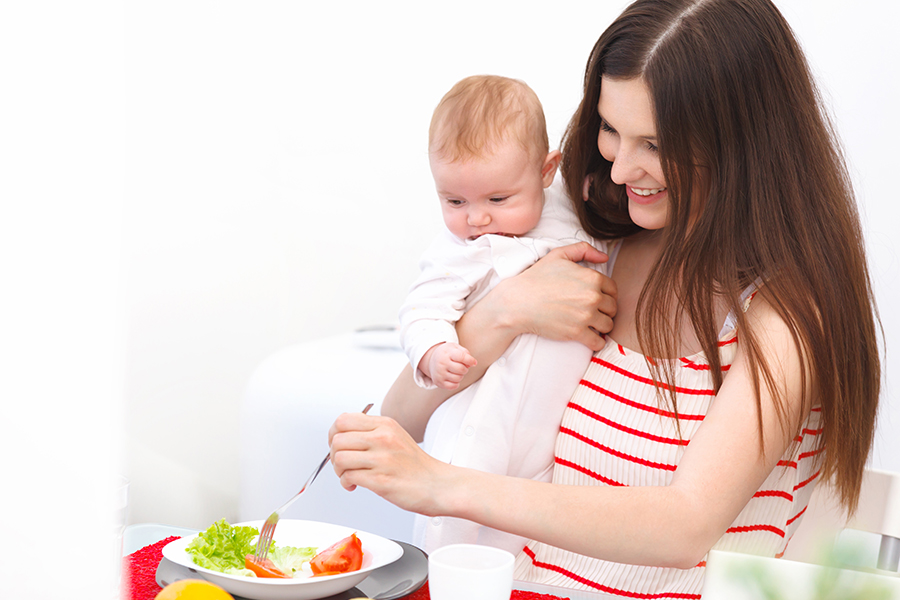|
|
Post by hazyl on Apr 25, 2019 11:39:05 GMT
Here are some nutritious foods you should eat while breastfeeding:
Fish and seafood: Salmon, seaweed, shellfish and sardines.
Meat: Beef, lamb, pork and organ meats, such as liver.
Fruits and vegetables: Berries, tomatoes, cabbage, kale, garlic and broccoli.
Nuts and seeds: Almonds, walnuts, chia seeds, hemp seeds and flaxseeds.
Other foods: Eggs, oats, potatoes, quinoa, buckwheat and dark chocolate.
|
|
|
|
Post by kaimas on May 9, 2019 12:37:17 GMT
Fruits and vegetables are the cornerstone of any healthy diet — pregnancy, breastfeeding or otherwise. Fruits provide vitamins like B1, B2, B6 and C, which help to keep you healthy and are necessary for milk production. In addition, fruits like apples, bananas, oranges and grapes contain antioxidants that rid your body of the free radicals that can build up and cause long-term damage. Oh and let’s not forget about the fiber. Fiber helps your body absorb the vitamins and minerals while also assisting in the digestive process. Vegetables also provide nutrients that are vital for a healthy breastfeeding diet. Green leafy vegetables like spinach, broccoli, kale and asparagus often provide nutrients that other foods simply cannot. For example, vegetables are the primary source of potassium, folate and vitamin A which all contribute to healthy cell function and division. All of these vitamins and minerals help produce the healthiest breast milk possible, while at the same time, giving you the energy you need to keep up with all your newborn’s needs.  |
|
|
|
Post by hazyl on May 28, 2019 23:30:08 GMT
Priya Tew, UK-based registered dietitian:
You don’t need a special diet during breastfeeding, but what you eat does need to be nutritionally balanced. That means plenty of fruit and vegetables, as well as whole grains such as oats, brown rice, and cereals and breads labelled ‘wholegrain’, ‘wholemeal’ or ‘wholewheat’. These foods, as well as potatoes, pasta and couscous, are also high in starch, an important source of energy.
You need lean protein too – good sources include chicken, eggs, pulses, lentils, fish and lean beef – and healthy fats, found in olive oil, nuts, seeds, avocados and oily fish such as salmon or mackerel. Oily fish is good for your health and your baby’s development, but you shouldn’t have more than two portions – around 140 g (5 oz) – of oily fish (or more than one portion of swordfish, shark or marlin) a week, as these may contain pollutants.
|
|
|
|
Post by kaimas on Jul 7, 2019 0:11:18 GMT
Things to avoid while breastfeeding:
-seafood
-coffee
-alcohol
The latter two are (hopefully) self-explanatory, but why avoid seafood? It may contain mercury, which could harm the baby.
|
|
|
|
Post by hazyl on Jul 26, 2019 22:30:21 GMT
While breastfeeding, also make sure to get plenty of
Vitamin B1 (Thiamin): Fish, pork, seeds, nuts and bread.
Vitamin B2 (Riboflavin): Cheese, almonds, nuts, red meat, oily fish and eggs.
Vitamin B6: Seeds, nuts, fish, poultry, pork, bananas and dried fruit.
Vitamin B12: Shellfish, liver, oily fish, crab and shrimp.
Choline: Eggs, beef liver, chicken liver, fish and peanuts.
Vitamin A: Sweet potatoes, carrots, dark leafy greens, organ meats and eggs.
Vitamin D: Cod liver oil, oily fish, some mushrooms and fortified foods.
Selenium: Brazil nuts, seafood, fish, whole wheat and seeds.
Iodine: Dried seaweed, cod, milk and iodized salt.
|
|
|
|
Post by kaimas on Feb 5, 2020 2:39:37 GMT
Make sure that you don't eat fish with a high content of mercury! Depending on where you live, that means shark, orange roughy, swordfish, marlin, tilefish (Gulf of Mexico) and king mackerel. Limit the intake of tuna to 8 to 12 ounces a week!
|
|
|
|
Post by hazyl on Apr 25, 2020 23:08:00 GMT
With the exception of vitamin D, breast milk contains everything a baby requires for proper development during the first six months of life.
So what is the most potent source for vitamin D?
The experts disagree, but from what I have read, it's probably salmon.
|
|
|
|
Post by kaimas on Dec 8, 2020 22:44:26 GMT
Dairy includes milk, cheese and yoghurt. It contains calcium and other essential nutrients. When possible, choose low-fat varieties, such as semi-skimmed, one per cent fat or skimmed milk, low-fat yoghurt and reduced-fat hard cheese! If you prefer dairy-free alternatives, such as soya drinks and yoghurts, go for the unsweetened, calcium-fortified versions!
|
|
|
|
Post by hazyl on Jan 13, 2021 23:48:17 GMT
Drink water only to satisfy your thirst! Many women find they are thirsty while breastfeeding; however, forcing yourself to drink fluids does not increase your supply.
|
|